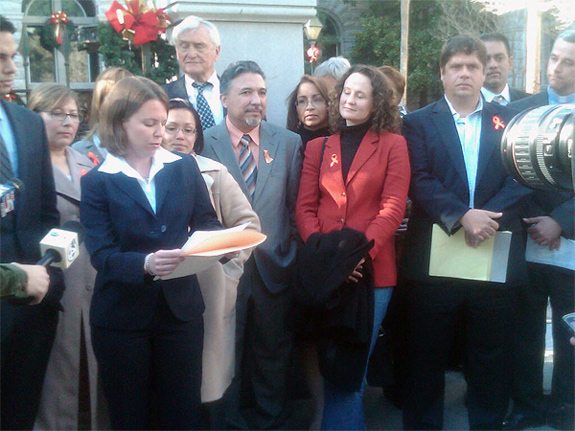SPLC, Civil Rights Coalition Asks Court to Block South Carolina’s Anti-Immigrant Law
The Southern Poverty Law Center and other civil rights groups asked a federal judge today to block South Carolina’s anti-immigrant law from taking effect on Jan. 1 because it is unconstitutional, interferes with federal laws and would cause great harm in the state.
The Southern Poverty Law Center and other civil rights groups asked a federal judge today to block South Carolina’s anti-immigrant law from taking effect on Jan. 1 because it is unconstitutional, interferes with federal laws and would cause great harm in the state.
“If this law goes into effect at the end of this month, the devastating impact will be immediate and irreparable,” said Michelle Lapointe, the SPLC’s lead attorney. “The experience of other states has made it clear the devastating social and economic upheaval of such laws.”
The law, SB 20, subjects South Carolinians, including U.S. citizens and legal residents, to unlawful search and seizure and interferes with federal authority over immigration laws. It invites racial profiling by requiring police to demand “papers” demonstrating citizenship or immigration status during traffic stops when they have “reasonable suspicion” that a person lacks immigration status. It criminalizes South Carolinians for everyday interactions with undocumented individuals, such as driving someone to church or renting a room to a friend.
The South Carolina law, as well as similar laws in Georgia, Alabama, Utah and Indiana, were inspired by Arizona’s SB 1070. Federal courts have already blocked key provisions of these laws in Arizona, Indiana and Georgia. A federal court in Alabama allowed some parts of that state’s law to take effect, leading to devastating humanitarian consequences, while other provisions have been blocked. Coalition members also have a pending case against Utah’s law.
The coalition filed suit against the South Carolina law in October. Today’s hearing concerned a motion for preliminary injunction – which seeks to temporarily block the law pending a final ruling on its constitutionality. The U.S. Department of Justice also is challenging the law and argued today that it should be blocked. The judge said he will rule on the motion before the law’s Jan. 1 effective date.
“Across the country, we have been fighting anti-immigrant laws because they are unconstitutional, lead to racial profiling and widespread civil rights abuses,” said Andre Segura, staff attorney with the ACLU Immigrants’ Rights Project, who argued in court on behalf of the coalition. “This misguided law should be blocked before it causes great harm and turns South Carolina into a police state.”
Officials from other coalition members issued the following statements:
Victoria Middleton, executive director of the ACLU of South Carolina: “South Carolina must not become like Alabama, whose inhumane anti-immigrant law has created a crisis in the state, separated families and devastated the business community. This law will hurt all South Carolinians and must be blocked before it wreaks havoc in our state.”
Linton Joaquin, general counsel of National Immigration Law Center: “Immigrant and Latino communities across the state can look forward to a ruling from the court before the law's implementation date of January 1. We cannot overstate the devastation and chaos created by the implementation of these laws as we have witnessed in Alabama. We will continue to fight until this law is permanently blocked.”
Victor Viramontes, Mexican American Legal Defense and Educational Fund national senior counsel: “We have asked the Court to block South Carolina's destructive law that unfairly and illegally targets the Latino community with improper arrests and detentions. Together with Arizona, Alabama and others, South Carolina's anti-immigrant law threatens to create a patchwork immigration policy divorced from the Federal Government's uniform immigration system.”
Diana Sen, senior counsel of LatinoJustice PRLDEF: “Latino immigrants continue to get unfairly blamed for all that ails our economy. This race-based demonization has no place in our post-segregation world. If unchecked, Latinos will be subjected to intensive status verifications every time they cross the street, and become the new second-class citizenry, an outcome abhorrent to anyone mindful of our country’s past.”
In addition to the SPLC, the coalition in the South Carolina case includes the ACLU, the ACLU of South Carolina, the National Immigration Law Center, the Mexican American Legal Defense and Educational Fund, the South Carolina Appleseed Legal Justice Center, LatinoJustice PRLDEF, and the law firms of Rosen, Rosen & Hagood and the Lloyd Law Firm.


